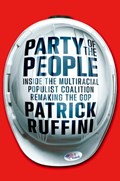An eye-opening, “must-read” (Ben Shapiro, founder of The Daily Wire) about the future of the Republican party as they unite working-class voters in a multi-racial, cross-generational populist coalition.
Donald Trump’s victory in the 2016 presidential election shocked the world. Yet his defeat in 2020 may have been even more surprising: he received 12 million more votes in 2020 than in 2016 and his unexpectedly diverse coalition included millions of nonwhite voters, a rarity for the modern Republican party.
In 2020, Trump defied expectations and few journalists, strategists, or politicians could explain why Trump had nearly won reelection. Patrick Ruffini, a Republican pollster and one of the country’s leading experts on political targeting, technology, and demography, has the answers—and the explanation may surprise you. For all his apparent divisiveness, Trump assembled the most diverse Republican presidential coalition in history and rode political trends that will prove significant for decades to come.
The shift is profound: seven in ten American voters belong to groups that have shifted right in the last two presidential elections, while under three in ten whites with a college degree belong to votes groups that are trending left. Together, this super-majority of right-trending voters forms a colorblind, populist coalition, largely united by its working-class roots, moderate to conservative views on policy, strong religious beliefs, and indifference to or outright rejection of the identity politics practice by the left. Not all these voters are Republican, and in certain corners of the coalition, only a small minority are. But recent elections are pointing us towards a future where party allegiances have been utterly upended.
The Party of the People demonstrates this data. Ruffini was as wrong as every pollster in 2016 and spent the intervening years figuring out why and developing better methods of analyzing voters in the digital age. Using robust data, he shifts you away from the complacent, widespread narrative that the Republican party is a party of white, rural voters. It is, but more importantly for its longevity, it’s a party of non-college-educated voters. And as fewer voters attend college, the Republican party shows no signs of stagnation. With rich data and clear analysis, Party of the People is a “deeply researched book” (Amy Walter, editor-in-chief of The Cook Political Report) that explains the present and future of the Republican party and American elections.

